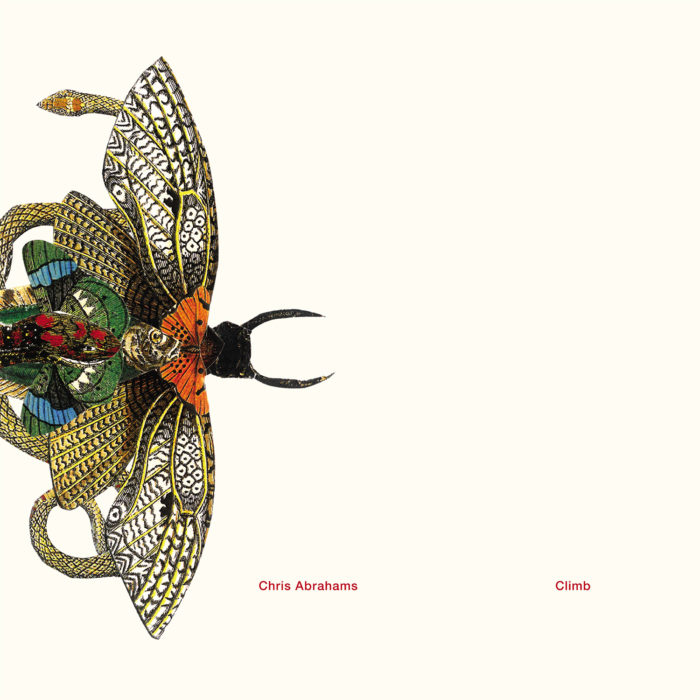For nearly three decades Chris Abrahams and Lloyd Swanton have been two thirds of The Necks.
That singular Australian trio is renowned worldwide, but its members do many other good, highly diverse musical things.
Chris Abrahams’ Climb and Lloyd Swanton’s Ambon are wonderful, in very different ways. Climb is all piano, solo. Ambon involves a shifting cast of thirteen…and a true story both dreadful and inspirational.
CLIMB
(atop this post is the album’s front cover. Design by Traianos Pakioufakis, artwork by Steve Heather. To see the remarkable, full artwork – albeit, alas, in low-res – click here)
At least one reviewer – in praising this album – described it as “ambient” music.
It is much more – much better – than that!
To this reviewer, truly “ambient” music is merely that – something which does not reward an intelligent listener’s full attention and repeated listenings.
This reviewer would almost like to describe this album as “mesmeric” or “hypnotic”.
I say “almost”, because all too often music which others hail as “mesmeric” or “hypnotic” strikes this reviewer as tediously mechanical, merely-repetitive, and lacking spark, soul, individuality.
All the above said, it is not hard to see why someone could describe some of Chris Abrahams’ piano solos as “ambient” or as “mesmeric” – you could let them “wash over you” as you read or cooked …and they often do have an insistent/repetitive aspect.
But they are so much more beautiful, precise, individual, interesting and worthy of your full attention than is most so-called “ambient” or “mesmeric” or “minimalist” music:
…and the merely-ambient do not deliver anything as darkly powerful as this:
Climb is a superb set of 7 solos, recorded very well in two different studios, over several years – a departure from Abrahams’ previous “capture one moment” solo sets.
Whether spacious or dense, all pieces are keenly focused, each note clarion-clear.
A deal of improvisation was probably involved, but there is no “noodling”, nothing “formless” or “self-indulgent”.
Links, additional info
Purchase from Australian distributor
Chris talks – very briefly – about Climb.
Waterfront Records Chris Abrahams page

AMBON
Rarely have I ever seen and heard something at once so musically ambitious and eclectic, yet so full of humility, compassion, appreciation.
Lloyd Swanton’s Ambon project honours a man he never met, and remembers what happened during World War Two on what is now an Indonesian island.
Ambon is rather closer to Darwin than Adelaide is to Sydney.
Stuart Swanton – younger brother of Lloyd’s father – died there on the 14th of August 1945, one day before Japan surrendered, and exactly fifteen years before the birth of Lloyd Stuart Swanton.
In 1941 the 1100 men of “Gull Force” were sent to defend Ambon; this Australian expedition was botched, even in its conception.
Most died, as POWs.
As Lloyd Swanton puts it in his double-CD’s beautifully and modestly written book:
So for the next three and a half years, Stuart was subjected to the Imperial Japanese Navy’s increasingly idiosyncratic theories on the interface between caloric intake and physical exertion.
Some of Stuart’s Ambon diary did survive – the only such, extant.
Ambon’ s book includes extracts from the diary; self-evidently, they were written by a man who was decent, humble, non-melodramatic, non-chauvinist.
Stuart was a devout Christian and a gifted musician – violist, singer and composer.
So, how on earth could anyone do musical justice to his memory…and to the broader story, in all its horror, humour, humdrum and transcendence?
Lloyd could have been forgiven, had he delivered something “worthy”, but of limited interest to those with no family connection to Stuart, or to the war in question, and/or those who have no religious belief.
As one of “those” – an atheist whose parents and their siblings had no combat role – I have enormously enjoyed Ambon and been deeply moved by it.
The listener’s experience is greatly enriched by the text and illustrations – Ambon is a reminder of the worth of the album-proper, in physical form, annotated lovingly – but many of Lloyd Swanton’s original pieces are richly satisfying, even out of context, standing alone.
Ambiont Jungle, for example, is a many-shaded, impressionistic evocation of a place almost unimaginably “exotic” to young Australians with no prior experience of any “foreign” place.
Click here to hear Ambiont Jungle and several other cuts, each decidedly unlike each other.
The musical menu is prodigiously diverse – from “free” to “gospel”, “island swing” to “chamber hymnal”, “carefree” to “sombre “, but all of it strongly connected to Stuart’s Ambon diary.
Lloyd Swanton composed most pieces; three are his arrangements of hymns composed by Stuart Swanton.
A shifting array of fine players and instruments is deployed, with effective, occasional use of “unlikely” instruments, including Stuart’s actual viola (played by James Eccles), ukulele (beautifully played by Chuck Morgan), kendang (an Indonesian drum, expertly wielded by Ron Reeves) and Michel Rose’s pedal steel guitar.
Reeds are played by Paul Cutlan and Sandy Evans, brass by James Greening and Alex Silver, Jon Pease is guitarist, Hamish Stuart drummer and the other primary percussionist is Fabian Hevia.
The leader is double bassist (especially eloquent, absolutely solo on Meat Case Base) and occasional narrator.
I liked Ambon immediately…but after umpteen revisits to it, I like it a deal more.
Links, additional info
Hear Lloyd speak, in a revealing interview with Andrew Ford
